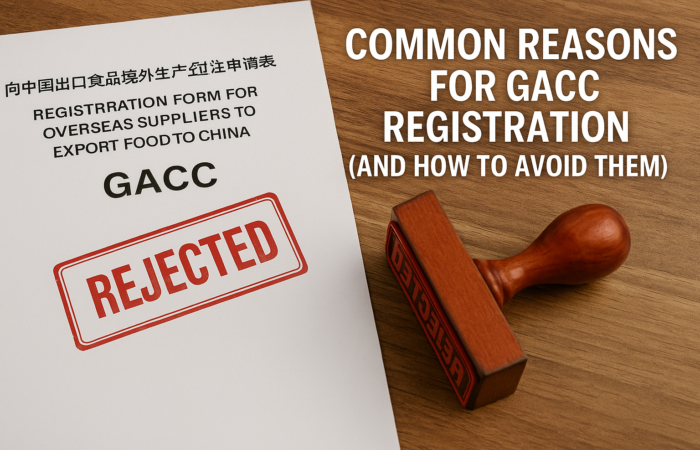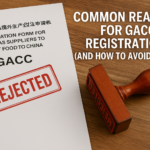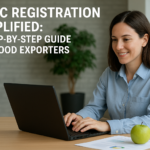Are you struggling to break into the lucrative Chinese food market? 🍜 You’re not alone. Many food exporters face a significant hurdle: GACC approval. Without it, your products might never make it past Chinese customs.
The General Administration of Customs of China (GACC) plays a pivotal role in regulating food imports, and their stamp of approval is non-negotiable. But why is this approval so crucial, and what does it mean for your business? From understanding the key requirements to navigating the complex approval process, gaining GACC approval can be a game-changer for your food product’s success in China.
In this blog post, we’ll dive deep into the world of GACC approval, exploring its importance, benefits, and impact on your food business. We’ll guide you through the essential steps to secure this vital certification and help you unlock the doors to one of the world’s largest consumer markets. 🔓🇨🇳
Understanding GACC and Its Role in China’s Food Imports
What is GACC?
The General Administration of Customs of China (GACC) is the primary regulatory body overseeing food imports into China. It plays a crucial role in ensuring food safety and quality standards for imported products.
| GACC Responsibilities | Impact on Importers |
|---|---|
| Product inspections | Quality assurance |
| Customs clearance | Smooth market entry |
| Import regulations | Compliance requirements |
GACC’s authority over food imports
GACC wields significant authority in regulating food imports, including:
- Setting import standards
- Conducting inspections
- Issuing certifications
- Enforcing compliance measures
These responsibilities make GACC approval essential for any food product entering the Chinese market.
The Importance of GACC Approval for Food Products
Ensuring food safety and quality
GACC approval is crucial for maintaining high food safety standards in China. The rigorous process ensures that imported products meet or exceed Chinese regulations, protecting consumers from potential health risks.
Meeting Chinese market standards
- Quality requirements
- Packaging regulations
- Labeling standards
| Aspect | Chinese Market Standard |
|---|---|
| Quality | Strict food safety regulations |
| Packaging | Specific material and design requirements |
| Labeling | Mandated information in Chinese language |
Key Requirements for GACC Approval
Registration process for overseas food producers
- Submit application to GACC
- Provide company details and product information
- Undergo facility inspection (if required)
- Obtain unique registration number
Product labeling and packaging standards
| Requirement | Description |
|---|---|
| Language | Chinese labels mandatory |
| Content | Ingredients, nutrition facts, origin |
| Packaging | Meet Chinese safety standards |
Compliance with these requirements is crucial for GACC approval. Overseas food producers must navigate the registration process carefully, ensuring all documentation is accurate and complete. Product labeling and packaging must adhere to strict Chinese standards, including proper language use and content disclosure.
Benefits of Obtaining GACC Approval
Access to the world’s largest consumer market
Gaining GACC approval opens doors to China’s vast consumer market, offering unparalleled opportunities for food exporters. With a population of over 1.4 billion, China presents a diverse and growing demand for imported food products.
Competitive advantage over non-approved products
GACC approval sets your product apart in the Chinese market. Approved products enjoy:
- Greater consumer trust
- Easier market penetration
- Higher perceived quality
| Aspect | Approved Products | Non-Approved Products |
|---|---|---|
| Market Access | Full access | Limited or no access |
| Consumer Trust | High | Low |
| Customs Clearance | Streamlined | Lengthy or impossible |
Navigating the GACC Approval Process
Step-by-step guide to application
- Register on GACC’s online platform
- Submit required documents:
- Product details
- Manufacturing process
- Quality control measures
- Pay application fees
- Undergo facility inspection
- Await approval decision
| Step | Timeframe |
|---|---|
| Registration | 1-2 days |
| Document submission | 1-2 weeks |
| Inspection | 2-4 weeks |
| Decision | 4-8 weeks |
Common pitfalls and how to avoid them
Avoid incomplete documentation and misunderstanding of Chinese labeling requirements. Engage with experienced consultants familiar with GACC processes. Ensure all product claims align with Chinese regulations. Prepare for potential delays by starting the application process well in advance of your intended export date.
Impact of GACC Approval on Your Food Business
Potential increase in market share
Obtaining GACC approval can significantly boost your food product’s market share in China. With access to the world’s largest consumer market, your business can:
- Reach a wider audience
- Compete with established brands
- Capitalize on growing demand for imported foods
Enhanced reputation and credibility
GACC approval lends credibility to your brand, enhancing its reputation among Chinese consumers and business partners. This can lead to:
| Benefit | Result |
|---|---|
| Trust | Increased consumer confidence |
| Quality perception | Higher perceived value of products |
| Business relationships | Improved partnerships with local distributors |
Securing GACC approval is a crucial step for any food product entering the Chinese market. This regulatory process not only ensures compliance with China’s stringent food safety standards but also opens doors to a vast and lucrative consumer base. By understanding GACC’s role, meeting key requirements, and navigating the approval process effectively, food businesses can position themselves for success in China’s competitive food industry.
As the global food market continues to evolve, GACC approval serves as a mark of quality and trustworthiness for Chinese consumers. For food businesses looking to expand their reach, investing time and resources in obtaining GACC approval is not just a regulatory necessity but a strategic move that can significantly impact long-term success in the Chinese market. Embrace this challenge as an opportunity to elevate your product standards and gain a competitive edge in one of the world’s largest and most dynamic food markets.





